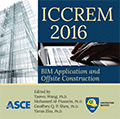International Conference on Construction and Real Estate Management 2016
Cold Region Green Village Comprehensive Evaluation Based on the Possibility Degree Method for Ranking Interval Numbers
Publication: ICCREM 2016: BIM Application and Off-Site Construction
ABSTRACT
With the goal of constructing economic, social, and environmental development green villages, meeting the requirements of energy-saving, water-saving, material-saving, environmental protection, climate suitability and construction economic, we establish a green village comprehensive evaluation model. According to the initial interval number matrix of each village given by experts, the comprehensive attribute values of villages are determined. Then, possibility degree matrix is developed and its ranking vector is determined based on the possibility degree method for ranking interval numbers. We applied it to the evaluation of villages, indicating that the model is not only able to sort the villages in total but also evaluate the advantages and disadvantages of villages in one respect, showing the improvement direction of green villages’ development.
Get full access to this chapter
View all available purchase options and get full access to this chapter.
ACKNOWLEDGMENTS
The research was supported by National Science and Technology Program of China during the 12th Five-Year Plan Period (Grant No.2013BAJ12B01). During the writing of the paper, the team provided the results of survey and analysis which made the article go well.
REFERENCES
Li, H.L. (2012). “Analyzes of ecological urban development present situation and problems in China.” Urban Studies, 19(8), 1–8. (in Chinese).
Li, H.L. and Yu, L. (2011). “Research advance of establishment of index system of ecological city.” Construction Technology, (13), 32–34. (in Chinese).
Yang, L., Yin, P. and Ye, M. (2013). “Ecological town planning and green architectural design in the context of construction of new countryside.” Proceedings from the 2013 International Conference on Green Building and Building energy Conservation, Beijing, China, 22–40. (in Chinese).
Wang, W.J. (2012). “Evaluation index system of green Nanjing city construction.” Areal Research and Development, 31(2), 62–65. (in Chinese).
Xu, Z.S. (2003). “Algorithm for priority of fuzzy complementary judgment matrix.” Journal of Systems Engineering, 16(4), 311–314. (in Chinese).
Xu, Z.S. and Da, Q.L. (2003). “Possibility degree method for ranking interval numbers and its application.” Journal of Systems Engineering, 18(1), 67–70. (in Chinese).
Information & Authors
Information
Published In
ICCREM 2016: BIM Application and Off-Site Construction
Pages: 678 - 684
Editors: Yaowu Wang, Ph.D., Professor, Harbin Institute of Technology, Mohamed Al-Hussein, Ph.D., Professor, University of Alberta, Geoffrey Q. P. Shen, Ph.D., Professor, The Hong Kong Polytechnic University, and Yimin Zhu, Ph.D., Professor, Louisiana State University
ISBN (Online): 978-0-7844-8027-4
Copyright
© 2017 American Society of Civil Engineers.
History
Published online: Aug 14, 2017
Authors
Metrics & Citations
Metrics
Citations
Download citation
If you have the appropriate software installed, you can download article citation data to the citation manager of your choice. Simply select your manager software from the list below and click Download.
